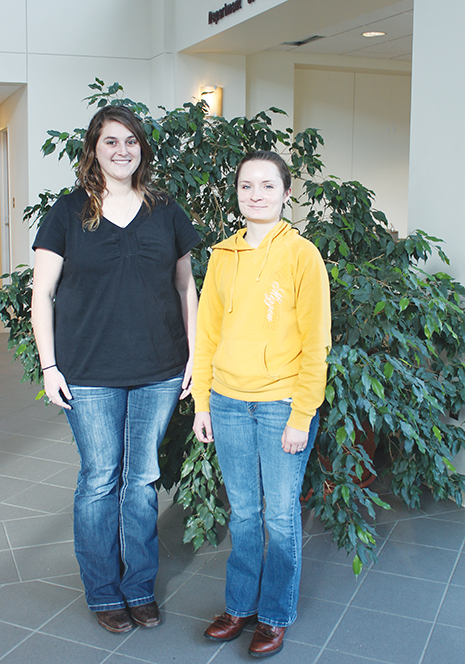
FAYETTEVILLE, Ark. – The University of Arkansas System Division of Agriculture department of animal science and Lincoln University in Jefferson City, Mo., have signed a memorandum of understanding to advance collaborative research and activities between the two institutions.
“I am very excited about this opportunity between Lincoln University and the department of animal science,” said Michael Looper, head of the U of A animal science department. “We all recognize these students are the next generation of animal scientists and leaders that will, in some way, help feed the world.”
Under the terms of the memorandum, the schools pledge to provide training and research opportunities to students and faculty. Activities include exchange of invitations to faculty, research personnel and graduate students for lectures and visits. There will also be invitations to participate in conferences, symposia and seminars plus practical training at selected field sites.
Kelsey Basinger and Jessica Hanlin, both Lincoln students, are already taking advantage of the new opportunity. Basinger said Lincoln has small ruminants such as goats and sheep but doesn’t have access to the large ruminants, horses and cows, as the U of A does. Such access provides them more research avenues that would not otherwise be available.
Basinger said she approached James Caldwell, assistant professor in the department of agriculture and environmental sciences at Lincoln, after she heard about the chance to take part in the collaboration with Arkansas.
Last spring she conducted a research project in conjunction with the U of A animal science department on tenderizing goat meat. She has not yet decided what her graduate research project will be.
Hanlin is pleased that Caldwell approached her about coming to the U of A. “It’s definitely a new kind of research for Dr. Caldwell with horses,” she said. “It’s a big deal for him to help send me down here and be willing to work on that kind of project.” Lincoln does not have horses and her research project on forage digestibility would not have been possible there.
Basinger has already seen a difference in her education since becoming a U of A student. “I like the diversity,” she said. Caldwell said he wants students to see the different sides of research that the University of Arkansas offers and that Lincoln University might not.
“With any M.S. or Ph.D., you get out what you put in. I want them to enjoy grad school like I did and learn how to deal with and endure stress,” Caldwell said. “I think it’s a great opportunity that opens up doors for our students that they have not had. It will be very beneficial to both schools.”
From a student prospective, Basinger believes that Lincoln has a lot to gain from the agreement. “In working with Arkansas, I think it will help Lincoln in many different ways because you all have more resources down here that we can utilize and better technology,” she said. “We can send it back and say this is what we found and we are doing well with it, so let’s try something different.”
Looper also believes the U of A will benefit. “This relationship will enrich our research and graduate student program,” he said. “Consequently, the results from this relationship will be realized for many years to come.”
Topics
Contacts
Jamie Newberry, public relations specialist
Animal Science Department
479-575-3195,